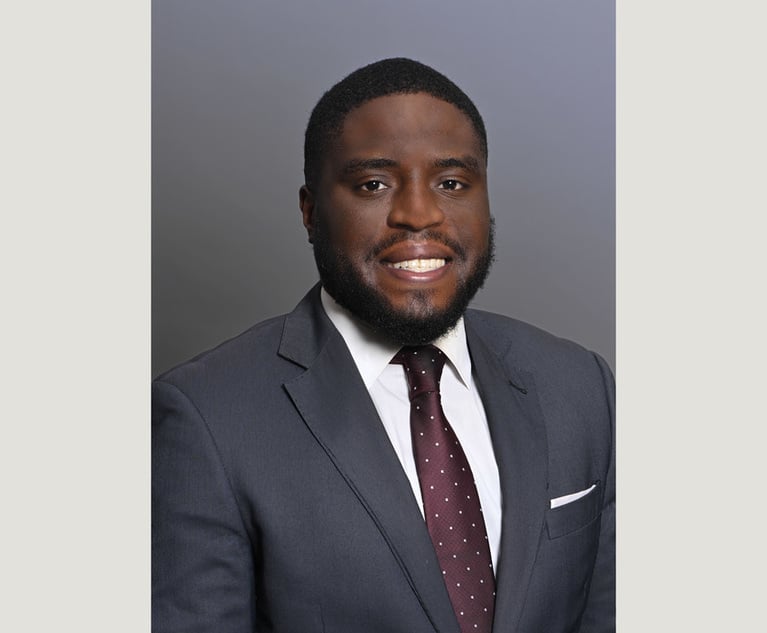Trademark Tacking and the Landscape of Priority Disputes
In , 574 U.S. ___ (2015), the U.S. Supreme Court in January resolved a split among the federal circuit courts by holding that juries, rather than judges, should ordinarily decide whether a trademark owner can "tack" together different marks for the purpose of establishing priority.
April 13, 2015 at 09:36 PM
7 minute read
In Hana Financial v. Hana Bank, 574 U.S. ___ (2015), the U.S. Supreme Court in January resolved a split among the federal circuit courts by holding that juries, rather than judges, should ordinarily decide whether a trademark owner can “tack” together different marks for the purpose of establishing priority. Under the tacking doctrine, a trademark user can make modifications to its trademark over time while still retaining its priority position over other users of the same mark. Whether a trademark user can tack marks together is measured by whether the marks are considered “legal equivalents” or, in other words, whether they create the same continuing commercial impression. In Hana Financial, the Supreme Court concluded that this inquiry must be viewed through the eyes of the ordinary consumer, and therefore is properly determined by a jury in most circumstances.
Trademark law creates the right to adopt and use a symbol or device—the trademark—to distinguish the goods made or sold by the owner of the mark, to the exclusion of others. The origins of trademark law date back to the earliest days of the common law, but federal statutory law—the Lanham Act—was adopted in the 1940s to provide a scheme of national protection for trademarks. State law similarly protects the rights of trademark owners. This entire body of law recognizes the importance of the date of first use of a trademark. Generally, the first user to “plant the flag” of use has the right to exclude all others from using the same or confusingly similar mark. This is known as the owner's priority. Priority is such an important concept in trademark law that even the owner of a federal registration (which gives the owner powerful weapons to exclude others) may not be able to trump the user of a similar unregistered mark, if that unregistered use predates the use disclosed in the federal registration.
The tacking doctrine is a common-law principle that permits a user of a mark to maintain his or her priority even when the mark undergoes some change, provided that the new mark creates the same “commercial impression.” As one example, Apple changed the iconic rainbow design of its familiar logo in the late 1990s, creating a monochrome look for the logo, which is now as famous as the old logo. Apple would argue that it did not lose its decades-old priority over the logo merely because the color of the logo changed, but who decides that question? For many years, the circuit courts were split on the issue, and the Supreme Court has now resolved that split with Hana Financial.
This content has been archived. It is available through our partners, LexisNexis® and Bloomberg Law.
To view this content, please continue to their sites.
Not a Lexis Subscriber?
Subscribe Now
Not a Bloomberg Law Subscriber?
Subscribe Now
NOT FOR REPRINT
© 2025 ALM Global, LLC, All Rights Reserved. Request academic re-use from www.copyright.com. All other uses, submit a request to [email protected]. For more information visit Asset & Logo Licensing.
You Might Like
View All


Trending Stories
- 1Restoring Trust in the Courts Starts in New York
- 2'Pull Back the Curtain': Ex-NFL Players Seek Discovery in Lawsuit Over League's Disability Plan
- 3Tensions Run High at Final Hearing Before Manhattan Congestion Pricing Takes Effect
- 4Improper Removal to Fed. Court Leads to $100K Bill for Blue Cross Blue Shield
- 5Michael Halpern, Beloved Key West Attorney, Dies at 72
Who Got The Work
Michael G. Bongiorno, Andrew Scott Dulberg and Elizabeth E. Driscoll from Wilmer Cutler Pickering Hale and Dorr have stepped in to represent Symbotic Inc., an A.I.-enabled technology platform that focuses on increasing supply chain efficiency, and other defendants in a pending shareholder derivative lawsuit. The case, filed Oct. 2 in Massachusetts District Court by the Brown Law Firm on behalf of Stephen Austen, accuses certain officers and directors of misleading investors in regard to Symbotic's potential for margin growth by failing to disclose that the company was not equipped to timely deploy its systems or manage expenses through project delays. The case, assigned to U.S. District Judge Nathaniel M. Gorton, is 1:24-cv-12522, Austen v. Cohen et al.
Who Got The Work
Edmund Polubinski and Marie Killmond of Davis Polk & Wardwell have entered appearances for data platform software development company MongoDB and other defendants in a pending shareholder derivative lawsuit. The action, filed Oct. 7 in New York Southern District Court by the Brown Law Firm, accuses the company's directors and/or officers of falsely expressing confidence in the company’s restructuring of its sales incentive plan and downplaying the severity of decreases in its upfront commitments. The case is 1:24-cv-07594, Roy v. Ittycheria et al.
Who Got The Work
Amy O. Bruchs and Kurt F. Ellison of Michael Best & Friedrich have entered appearances for Epic Systems Corp. in a pending employment discrimination lawsuit. The suit was filed Sept. 7 in Wisconsin Western District Court by Levine Eisberner LLC and Siri & Glimstad on behalf of a project manager who claims that he was wrongfully terminated after applying for a religious exemption to the defendant's COVID-19 vaccine mandate. The case, assigned to U.S. Magistrate Judge Anita Marie Boor, is 3:24-cv-00630, Secker, Nathan v. Epic Systems Corporation.
Who Got The Work
David X. Sullivan, Thomas J. Finn and Gregory A. Hall from McCarter & English have entered appearances for Sunrun Installation Services in a pending civil rights lawsuit. The complaint was filed Sept. 4 in Connecticut District Court by attorney Robert M. Berke on behalf of former employee George Edward Steins, who was arrested and charged with employing an unregistered home improvement salesperson. The complaint alleges that had Sunrun informed the Connecticut Department of Consumer Protection that the plaintiff's employment had ended in 2017 and that he no longer held Sunrun's home improvement contractor license, he would not have been hit with charges, which were dismissed in May 2024. The case, assigned to U.S. District Judge Jeffrey A. Meyer, is 3:24-cv-01423, Steins v. Sunrun, Inc. et al.
Who Got The Work
Greenberg Traurig shareholder Joshua L. Raskin has entered an appearance for boohoo.com UK Ltd. in a pending patent infringement lawsuit. The suit, filed Sept. 3 in Texas Eastern District Court by Rozier Hardt McDonough on behalf of Alto Dynamics, asserts five patents related to an online shopping platform. The case, assigned to U.S. District Judge Rodney Gilstrap, is 2:24-cv-00719, Alto Dynamics, LLC v. boohoo.com UK Limited.
Featured Firms
Law Offices of Gary Martin Hays & Associates, P.C.
(470) 294-1674
Law Offices of Mark E. Salomone
(857) 444-6468
Smith & Hassler
(713) 739-1250






